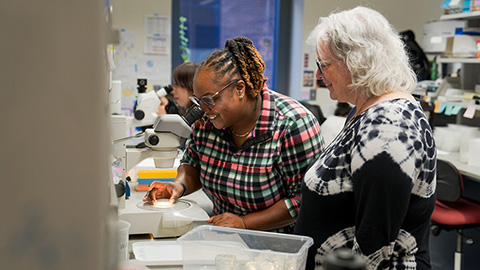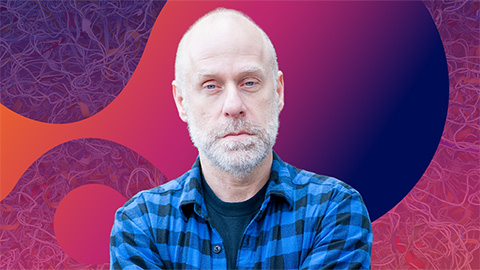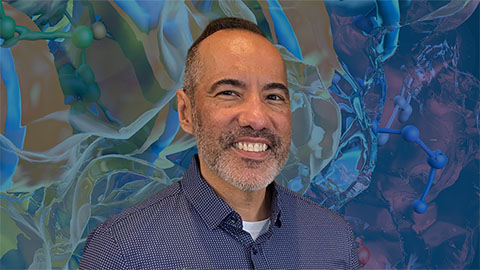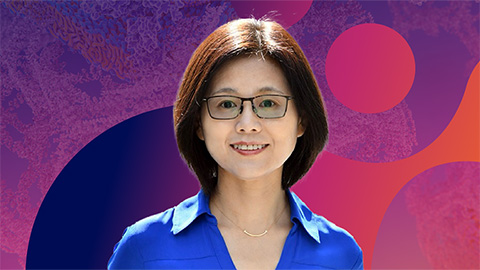Regev recognized for rigorous integration of experimental and computational approaches
Aviv Regev of the Broad Institute at the Massachusetts Institute for Technology and Harvard University is the latest recipient of the year’s American Society for Biochemistry and Molecular Biology’s Earl and Thressa Stadtman Scholar Award.
The award is given to researchers with outstanding achievement in the fields of biochemistry and molecular biology who have fewer than 10 years of postdoctoral experience.
Regev, a Howard Hughes Medical Institute early career scientist, was nominated for her insightful work on the evolution of regulatory networks in cells and for her development of cutting-edge techniques that have broad implications in diverse fields of molecular biology.
“At the conceptual level, Aviv is interested in one of the deepest and most general of biological questions: how biological circuits function and rewire – from the rapid responses of immune cells within hours, to developmental commitments by cells in the blood system, to genetic changes in cancer, to long-term evolutionary changes over millions of years,” said Eric Lander, president and director of the Broad Institute, who nominated Regev for the award.
The bulk of Regev’s work focuses on the short timescale responses of dendritic cells to pathogen challenge. “Dendritic cells were a superb choice for deciphering cell circuits,” says Jonathan Weissman, an HHMI investigator and professor at the University of California, San Francisco, School of Medicine, who also nominated Regev. “First, the dendritic cell response is physiologically and clinically important its own right and more broadly serves as a model for other impulse responses to environmental challenges that are ubiquitous in biology. Second, the well-characterized stimuli provide unique handles with which to resolve regulatory relations computationally.”
It is this rigorous integration of experimental and computational approaches that Regev’s nominators emphasize. “Her strategy starts by monitoring the transition in exquisite detail. She then uses these data to drive her model-building efforts. And finally she perturbs the system in a manner designed to test and challenge her models,” Weissman said. “When applied iteratively, this approach leads to robust models that explain the observed data and have true predictive value.”
Lander added, “Aviv was an early pioneer in the reconstruction of networks using probabilistic models, and her work has defined the field today. In the past few years, she has expanded these models to the dynamic setting, where the network components and connectivity change with time, a very difficult computational problem.”
Regev also has been a pioneer in RNA sequencing to elucidate these complex changes in regulatory networks. She noted that the bulk responses she observed in her dendritic cell work may be concealing important changes at the single-cell level; thus, she and her colleagues adapted a single-cell RNA sequencing approach and found that, even within a homogeneous population of cells, there were subpopulations that responded at different times and in different manners.
Weissman said this work is just one more example of Regev’s commitment to staying at the forefront of cutting-edge technologies. “The single-cell work nicely illustrates how Aviv is able to use a technical advance in conjunction with her analytical approaches to drive the discovery of a new principle underlying a regulatory network,” he said.
Additionally, Regev and her colleagues had to develop algorithms to handle these novel types of data sets, writing programs (such as Trinity) that allow for data analysis without prior knowledge of an organism’s genes or even a sequenced genome. Trinity today has more than 20,000 users. “Notably, Trinity has opened up the study of nonmodel organisms; it is now the de facto standard for such work in all kingdoms, especially plants, invertebrates and fungi,” Lander said.
Regev will receive her award during the Experimental Biology 2014 conference in San Diego, where she will deliver an award lecture. Her presentation will take place at 9: 05 a.m. Sunday, April 27, in Room 6A of the San Diego Convention Center.
Enjoy reading ASBMB Today?
Become a member to receive the print edition four times a year and the digital edition monthly.
Learn moreGet the latest from ASBMB Today
Enter your email address, and we’ll send you a weekly email with recent articles, interviews and more.
Latest in People
People highlights or most popular articles

Building a stronger future for research funding
Hear from Eric Gascho of the Coalition for Health Funding about federal public health investments, the value of collaboration and how scientists can help shape the future of research funding.

Fueling healthier aging, connecting metabolism stress and time
Biochemist Melanie McReynolds investigates how metabolism and stress shape the aging process. Her research on NAD+, a molecule central to cellular energy, reveals how maintaining its balance could promote healthier, longer lives.

Mapping proteins, one side chain at a time
Roland Dunbrack Jr. will receive the ASBMB DeLano Award for Computational Biosciences at the ASBMB Annual Meeting, March 7–10, just outside of Washington, D.C.

2026 voter guide
Learn about the candidates running for Treasurer-elect, Councilor and Nominating Committee.

Meet the editor-in-chief of ASBMB’s new journal, IBMB
Benjamin Garcia will head ASBMB’s new journal, Insights in Biochemistry and Molecular Biology, which will launch in early 2026.

Exploring the link between lipids and longevity
Meng Wang will present her work on metabolism and aging at the ASBMB Annual Meeting, March 7-10, just outside of Washington, D.C.

